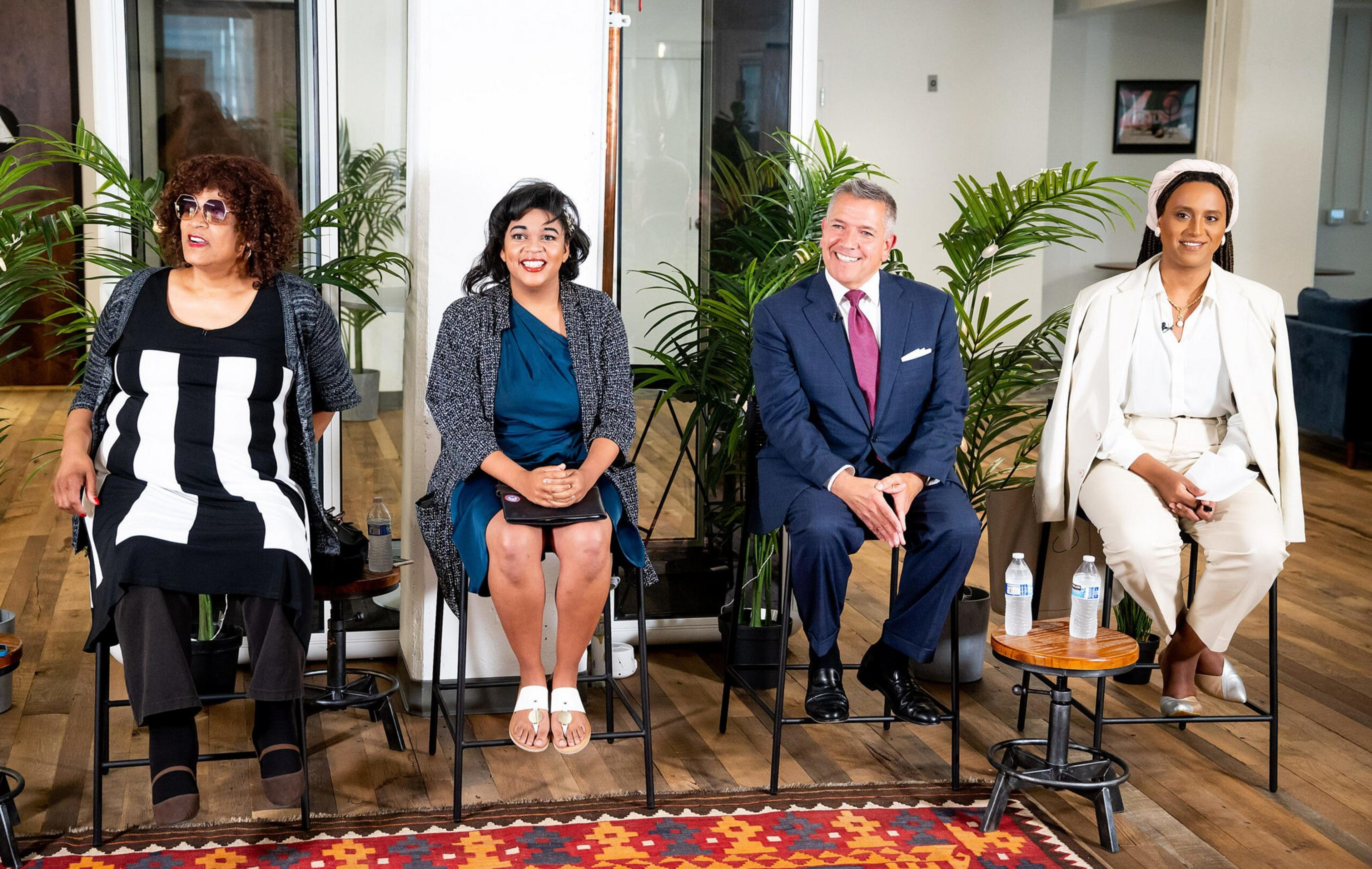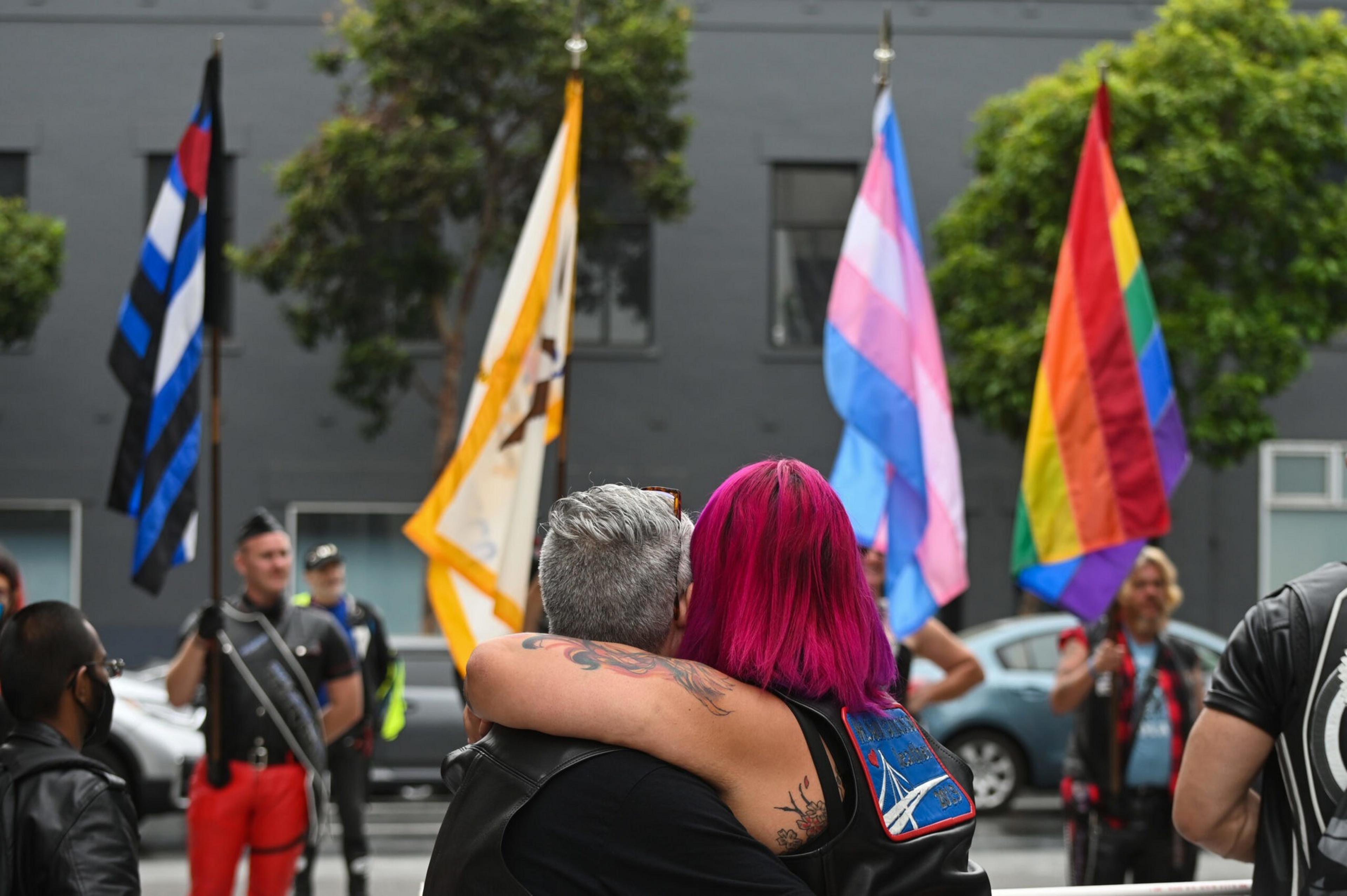With rainbow-painted crosswalks, a transgender cultural district (opens in new tab) and an LGBTQ+ population l (opens in new tab)arger than any other metropolitan area (opens in new tab), San Francisco is easily the queer mecca of the United States. In politics, SF’s queer community has been a particularly active force in shaping both local and national conversations surrounding marriage equality, gender equity and inclusion and more.
But how does the average LGBTQ+ voter see the city and its issues? Do queer San Franciscans operate as a voting bloc in city politics?
The Standard’s Fall Voter Poll found that LGBTQ+ voters tend to lean more progressive than the average San Franciscan. And their skew extends not only to party identification or progressive labels but also to city issues ranging from policing to homelessness and tech.

A Large Segment of the Electorate
In San Francisco, queer voters are a large group. The Standard’s Fall Poll finds 23% of voters identify as LGBTQ+, which is comparable to the 24% who identified as queer in the Spring Poll. The findings mean the LGBTQ+ voting block accounts for a larger portion of SF voters than that of tech workers, parents, bike riders, labor union members and similar in size with dog owners and native San Franciscans.
Among LGBTQ+ voters in SF, the largest group identifies as gay (53%), while 17% identify as bisexual, 8% as lesbian and 5% as transgender.
Pushing Past Representation Alone
San Francisco’s LGBTQ+ community is not a monolith, representing dozens of different gender and sexual identities. And while many think the community’s diversity contributes to its cultural richness, diverging perspectives and experiences within the community create their own challenges for understanding queer politics—particularly among generations, as more and more Gen Zers reach voting age.
“LGBTQ representation matters in our government offices, in appointments and in elected office,” said Stephen Torres, executive co-chair of the Castro LGBTQ Cultural District. “But that comes with a great deal of responsibility because you’re not just representing yourself as an identity, you’re representing many identities.”
Though identity representation is clearly an important part of LGBTQ+ politics, many queer San Franciscans say that choosing who to vote for is more complicated than that—especially as more LGBTQ+ candidates run for office and tout diverging political views.
Three LGBTQ+ Candidates in One Race
This question has come to a head in San Francisco, where queer identity and representation have recently become major talking points in the District 6 supervisor election. Three LGBTQ+ candidates will go head to head, including two Black transgender women and an HIV-positive gay man.
Frances, a 31-year-old trans woman living in SoMa, says she supports Honey Mahogany for the District 6 election and that her representation in office would be historically important.
But identity isn’t everything, and for many LGBTQ+ voters like Frances, it’s the combination of lived experience and policies that drives their voting decisions.
“Honey just never stopped being visible in the community and as an advocate for trans people in the city. I think as a supervisor, she would continue that work,” Frances said. “But if Honey was, say, a cis[gender] woman, and was still as active and supportive as she has been, I would definitely be [as] equally enthusiastic as I am now.”

Dramatic Growth in Elected Officials
Nevertheless, queer representation in politics has only grown in the last decade, both on the local and national levels. LGBTQ+ political representation doubled (opens in new tab) from 2017 to 2022, with over 1,000 queer elected officials in office this year.
And many queer voters say that what draws them—and keeps them—in San Francisco is its welcoming LGBTQ+ community and the culture of accountability that empowers queer San Franciscans to get involved in city politics.
“People are now realizing that being political isn’t a negative thing—being political is just the same as being active, like breathing,” Torres said. “You’re being an active participant in your own future. Being political is giving yourself agency and determination over your life.”
Left-of-Center Views
Though compounding concerns about crime, drug use and homelessness have turned many San Franciscan voters in The Standard’s Poll away from progressive policies, LGBTQ+ voters are more likely to have become more progressive.
More than half of queer voters say they are just as progressive or more progressive than they were three years ago. About 14% identify as much more progressive than before, compared to just 7% of cisgender straight voters.
Nonetheless, 47% of SF’s queer voters became less progressive over the past three years as a result of the city’s challenges.
“It is not compassionate nor progressive to have sick people living on our sidewalks. It is not OK to have people doing drugs on the sidewalk,” said Pam, a 59-year-old Latina lesbian who reports becoming less progressive over the last year.
Queer voters still tend to skew farther to the left when it comes to party affiliation: 89% of LGBTQ+ voters identify as Democrats, compared with 70% of cisgender straight voters. Just 2% of queer voters in SF are Republicans compared with 15% of cisgender straight San Franciscans.
But to most observers, the queer community’s progressive lean does not come as a surprise.
“The queer liberation movement was an advancement of a lot of goals that are shared by vulnerable communities: equity, inclusion, diversity and access,” said Torres. “It would make sense that we skew progressive, because these are common goals with a lot of progressive movements.”

The findings of the Standard’s Fall Poll line up with long-term, nationwide trends among LGBTQ+ voters. Prior to the 2016 presidential election, the Pew Research Center found about 8-in-10 registered queer voters identified (opens in new tab) or leaned Democratic. In 2014 midterm polling (opens in new tab), LGBTQ+ voters overwhelmingly favored Democratic candidates, while Joe Biden, (opens in new tab) Hillary Clinton and Barack Obama secured support (opens in new tab) from nearly three-quarters of LGBTQ+ voters in their respective presidential races.
Broad Support for Progressive Policies and Perspectives
As with party affiliation, LGBTQ+ voters also tend to support more progressive policies and perspectives. Torres says voters see these solutions as crucial in addressing the city’s problems both within and outside of the queer community.
“What’s important for [LGBTQ+ Democratic] clubs and for all LGBTQ activists and electeds is that they’re always looking for how to build these bridges, to form these coalitions so that we can ensure equity and inclusion and stability for everyone, not just our communities in particular,” said Torres.
A majority of LGBTQ+ voters polled by The Standard wish SF was less dependent on the tech industry; 53% favor legalizing psychedelic drugs; and nearly three-fourths support turning San Francisco into a sanctuary city for abortion rights—views largely shared by progressives and leftists.
Housing, in particular, stood out as one of the hot-button issues for queer voters: 26% of LGBTQ+ respondents want SF to prioritize increasing housing affordability, compared with just 18% of straight voters. Queer voters tended to view a lack of new housing options as one of the top causes for the homelessness crisis, and 39% said they want the city to build only affordable, below-market-rate housing.
Queer voters are more likely to be against tough-on-crime policies that strengthen policing in San Francisco than straight voters. LGBTQ+ voters were more likely to blame city agencies and their policies—not individuals struggling with homelessness or addiction—as responsible for ongoing drug and safety problems compared to straight voters.
Views on City Hall
Nearly three-fourths of LGBTQ+ voters disapprove of the San Francisco Police Department, compared with 57% of cisgender straight poll respondents. Queer voters are less likely to think the city needs to hire more police officers, or that SFPD should have increased access to surveillance cameras.
“This city was once a shining place of joy and has been overrun by homelessness, passive cops who take better care of Macy’s and Tiffany’s than all of the citizens combined,” said one poll respondent, a gay, 37-year-old male who identified as an Independent.
Ultimately, many LGBTQ+ voters seem to see the city as a place where progressive ideals are important but ultimately unrealized in local politics. Nearly 30% of queer respondents think City Hall’s solutions for the homelessness crisis are not progressive enough, and 12% think that the policies in place have not had enough time to make a noticeable difference.
“SF is a beautiful city. I think it could be much better if we could be more radical, go deeper to the root of our problems, rather than blaming whatever current administration is in charge, in our approach to caring for each other,” said one respondent, a Black queer 69-year-old.

